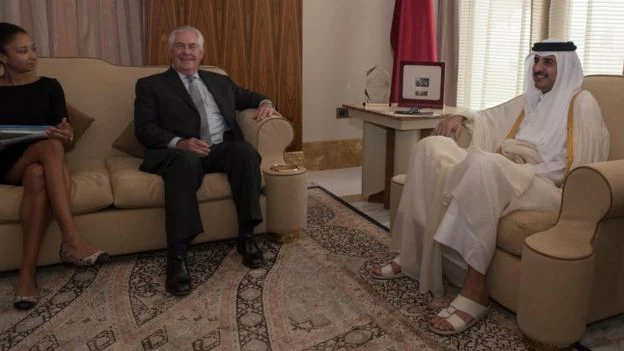US President Donald Trump and Russian counterpart Vladimir Putin had another, previously undisclosed conversation at this month's G20, the White House has confirmed.
They spoke towards the end of a formal dinner but the White House has not revealed what was discussed.
President Trump has condemned media revelations of the talks as "sick".
The two leaders' relationship is under scrutiny amid allegations of Russian interference in the US election.
US intelligence agencies believe Moscow tried to tip the election in Mr Trump's favour, something denied by Russia. Mr Trump has rejected allegations of any collusion.
The extra conversation happened during a private meal of heads of state at the G20 summit in Hamburg earlier in the month.
Mr Trump left his seat and headed to Mr Putin, who had been sitting next to Mr Trump's wife, Melania, US media said. The US president was alone with Mr Putin, apart from the attendance of the Russian president's official interpreter.
Mr Trump had been seated next to Japanese PM Shinzo Abe's wife, so the US interpreter at the dinner spoke Japanese, not Russian. No media were in attendance.
Analysis: Uncomfortable questions raised
Jonathan Marcus, BBC News defence and diplomatic correspondent
Given the poor state of relations between Washington and Moscow and the controversy surrounding Russia's efforts to interfere with the US presidential campaign, each and every encounter between Mr Putin and Mr Trump is bound to be carefully scrutinised.
Thus the apparently impromptu discussion between the two men at the G20 dinner inevitably raises many questions. What was President Trump seeking to do in approaching the Russian president? Were matters of substance discussed? If so, why was no formal note taken? And why did the US president have to rely upon a Russian official for translation?
This is all highly unusual, especially at a time when relations between the two countries are laden with so many problems.
Mr Trump also appeared unaware of another dimension - the message that his tete-a-tete would send to other leaders in the room, who must have watched the US president's gambit with some unease.
The length of the talks has been disputed.
Ian Bremmer, president of the US-based Eurasia Group, who first reported them in a newsletter to clients, said: "Donald Trump got up from the table and sat down with Putin for about an hour. It was very animated and very friendly."
No-one else was nearby, so the topics of discussion were not known, he said.
Mr Bremmer had not been at the dinner but said details were given to him by unnamed attendees who, he said, were "flummoxed, confused and startled" by the turn of events.
Mr Bremmer told Bloomberg he had never before seen "two major countries with a constellation of national interests that are as dissident while the two leaders seem to be doing everything possible to make nice-nice and be close to each other".
In a statement, a senior White House official said there was no "second meeting", just a brief conversation after dinner.
At the earlier, formal meeting, their first face-to-face encounter, Mr Trump said he had repeatedly pressed Mr Putin about the allegations of interference in the US vote.
"I said, 'Did you do it?' He said, 'No, I did not, absolutely not.' I then asked him a second time, in a totally different way. He said, 'Absolutely not.'"
There are congressional investigations, and one by a special counsel, into the allegations of Russian interference in the US election and possible collusion with the Trump team.
On Tuesday, the Senate intelligence committee said it wanted to interview Mr Trump's son, Donald Jr, and other members of the Trump team, over a meeting they had with a Russian lawyer in June last year.
On Wednesday, Ms Veselnitskaya told Russia's RT television channel she would be willing to testify before the Senate on the matter
Meanwhile, the White House said Mr Trump would nominate former Utah governor Jon Huntsman as ambassador to Russia, a key post for a president who promised to improve relations with Moscow.
Mr Huntsman, who served as ambassador to China and Singapore, needs to have his name confirmed by the Senate.
The suspicions over Russian interference are likely to play a significant factor in his confirmation process, correspondents say



















